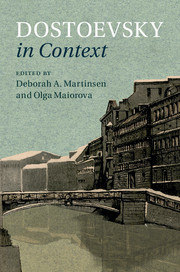Book contents
- Frontmatter
- Contents
- List of illustrations
- Notes on contributors
- Acknowledgments
- Note on citation, transliteration, glossary, and dates
- Chronology
- 1 Introduction: the many worlds of Dostoevsky
- PART I SOCIAL, HISTORICAL, AND CULTURAL CONTEXTS
- PART II LITERATURE, JOURNALISM, AND LANGUAGES
- 25 Modern print culture
- 26 Realism
- 27 Dostoevsky: translator and translated
- 28 Travel and travel writing
- 29 Folklore
- 30 Foreign languages
- 31 Theater
- 32 Dostoevsky's journalism and fiction
- 33 Dostoevsky's journalism in the 1860s
- 34 Dostoevsky's journalism in the 1870s
- 35 Censorship
- Glossary
- Further reading
- Index
- References
26 - Realism
from PART II - LITERATURE, JOURNALISM, AND LANGUAGES
Published online by Cambridge University Press: 18 December 2015
- Frontmatter
- Contents
- List of illustrations
- Notes on contributors
- Acknowledgments
- Note on citation, transliteration, glossary, and dates
- Chronology
- 1 Introduction: the many worlds of Dostoevsky
- PART I SOCIAL, HISTORICAL, AND CULTURAL CONTEXTS
- PART II LITERATURE, JOURNALISM, AND LANGUAGES
- 25 Modern print culture
- 26 Realism
- 27 Dostoevsky: translator and translated
- 28 Travel and travel writing
- 29 Folklore
- 30 Foreign languages
- 31 Theater
- 32 Dostoevsky's journalism and fiction
- 33 Dostoevsky's journalism in the 1860s
- 34 Dostoevsky's journalism in the 1870s
- 35 Censorship
- Glossary
- Further reading
- Index
- References
Summary
When speaking of Dostoevsky's realism, critics and readers often qualify the term, adding epithets – fantastic, romantic, psychological, protomodernist, and modernist, among others. Even Dostoevsky himself once used the phrase “in a higher sense” to distinguish his practice of realism. But realism, as such, is a murky concept to begin with. It is known for meaning different things. It has been applied in a general way to literary works of all times that represent what is taken as “real” life. In the study of literature, the term is popularly used to refer to a “period concept” or a “historical impulse” that flourished between Romanticism and Modernism, albeit with common ground and temporal overlap with each. Realism existed in a pure or programmatic form as le réalisme, a movement in art and literature in France in the middle of the nineteenth century, but literary historians and critics have subsequently struggled to define garden-variety realism. Among the properties that recur in such attempts at definition is a commitment to representing contemporary (nineteenth-century) social life in its historical context, with reference to current views of how the world works, which René Wellek characterized “as the orderly world of nineteenth-century science, a world of cause and effect, a world without miracles.” Although an aura of objectivity if not scientific detachment is expected, works of realism are laced with varying degrees of critical spirit, social critique, moral protest, and political engagement. Consequently, as a blanket term, realism has been used to envelop the output of a host of nineteenth-century novelists, from Austen to Zola.
When Dostoevsky published his first novel, Poor Folk, in 1846, the Russian literary world greeted him as an exciting new voice in what was known as the Natural School*, an early movement in Russian realism, not to be confused with the movement known as le naturalisme, a later spin-off of French realism that featured Zola's doggedly scientistic application of its precepts. According to the literary critic Vissarion Belinsky, Nikolai Gogol's depictions of Russian contemporary life inaugurated a new trend of socially responsible literature aimed at raising consciousness and making readers critical of the facts of Russian life.
- Type
- Chapter
- Information
- Dostoevsky in Context , pp. 229 - 235Publisher: Cambridge University PressPrint publication year: 2016



